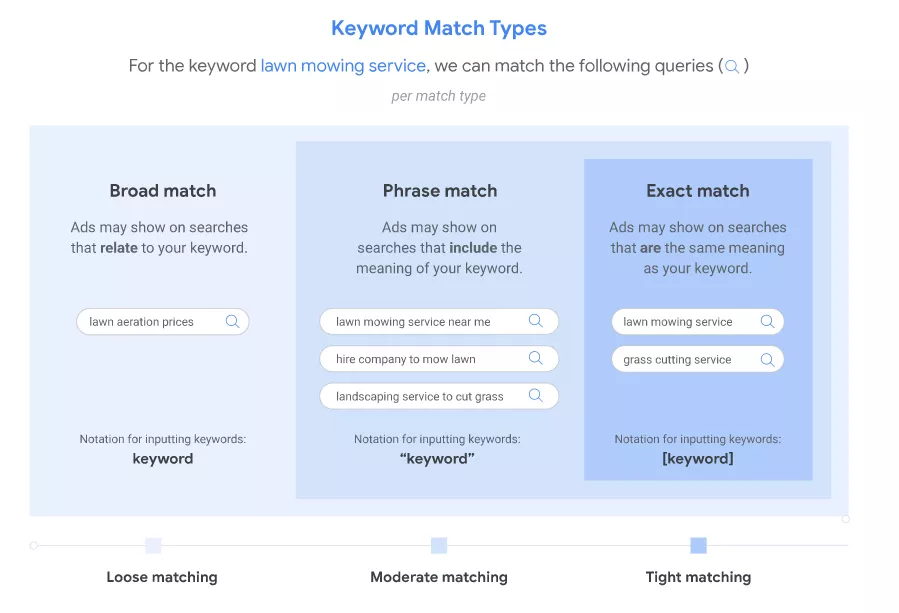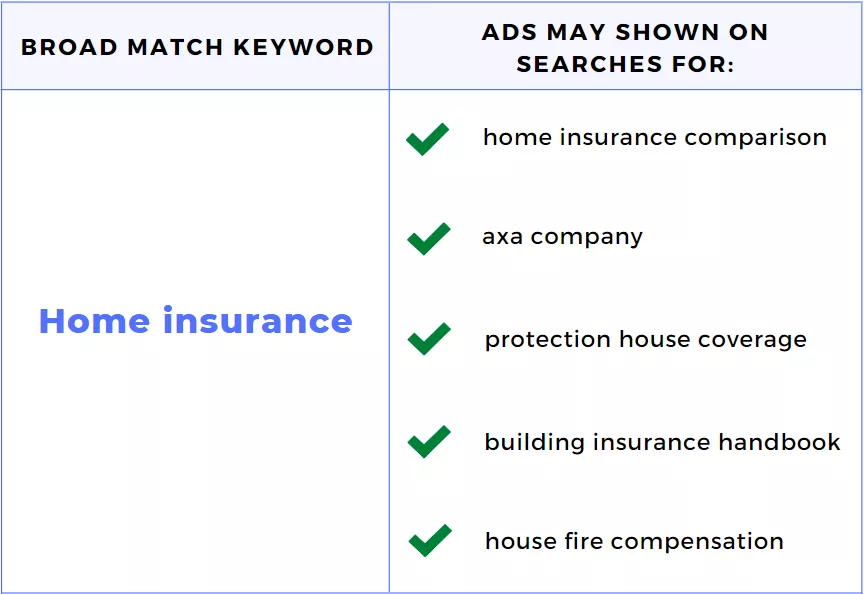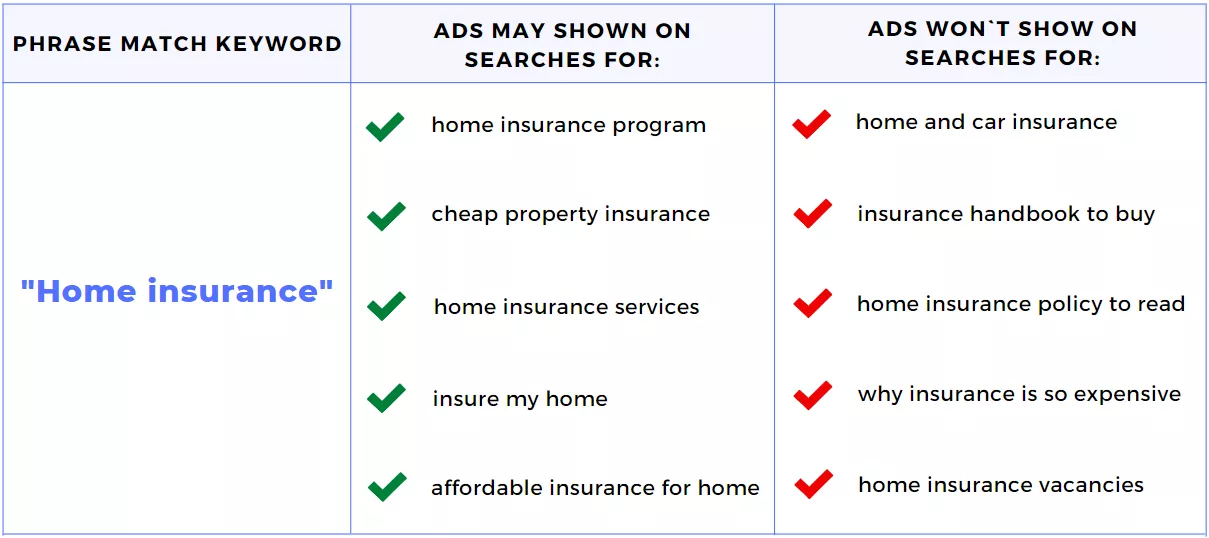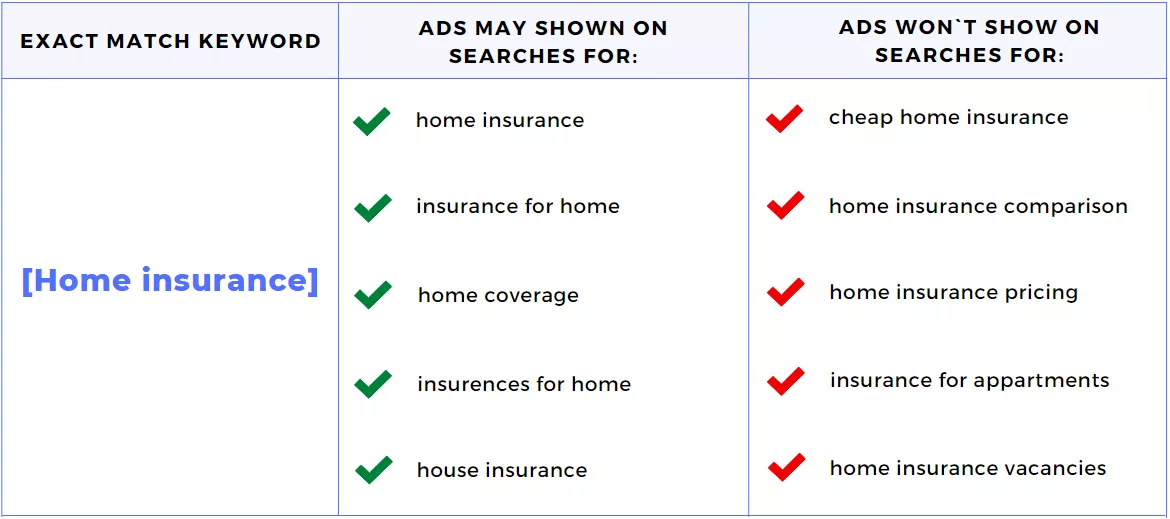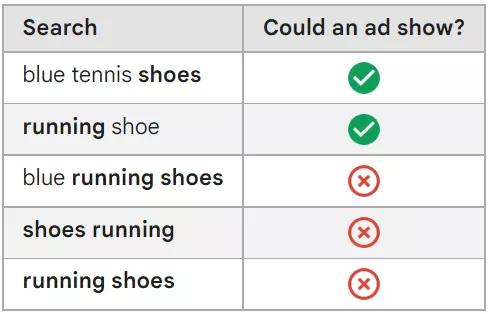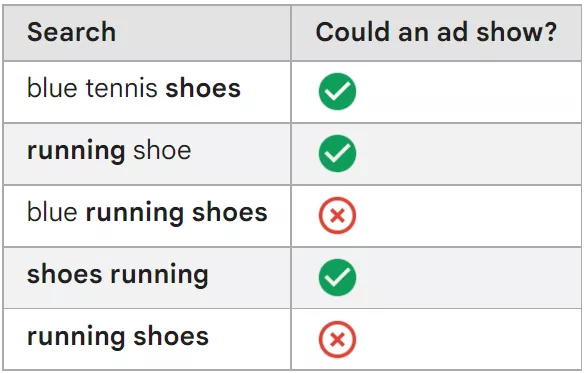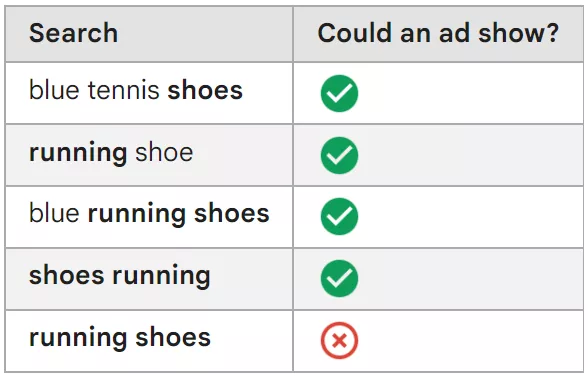What are Google Ads Match Types? Search advertising - is a powerful channel for customer acquisition for different types of businesses. Meanwhile, search advertising in Google Ads is one of the most difficult tools.
One of the key fundamentals of setting search ads campaigns is proper keyword match type selection.
Table of contents:
- Organizing The Keyword Match Types in Your Account
- Exact Match or Phrase Match – What to choose?
- Negative Keyword Match Types
- 3 Reasons Why Google Ads Match Types Are So Important
- Tools to Create and Work with Keyword Match Types
- In Conclusion
What are Google Ads Match Types?
To launch Google Search Ads advertisers try to use the most relevant keywords which describe their product. The pivotal point to achieve the closest match of people`s searching terms with your keywords is the usage of Google Ads match types.
Therefore, Google Ads match types determine how closely the keyword needs to match with the user’s search query thereby the ads can be considered for the auction.
For instance, if the user is searching for jackets with a certain fabric type - “buy denim jacket”, it makes sense for the advertiser to show the user exactly an ad with denim jackets. So here the solution - the keyword match types usage.
Well, let's find how to work with match types in Google Ads, what are their pros and cons and when it's the most appropriate to use a certain match type.
The Keyword Match Type Options
Google Ads has 3 keyword match type options:
- Broad match
- Phrase match
- Exact match
Their brief specifics are provided in the picture below.
Basically broader match types capture all the queries of narrower match types, plus more. This means that a phrase match keyword will match all the searches as the same keyword in an exact match. Similarly, a broad match keyword will match all the searches of equivalent phrase and exact match keywords, plus additional related searches. Therefore, you get the same benefits of multiple match types in one broad match type without needing to repeat keywords.
Let's look at the specifics of each match type in more detail.
Broad Match
Broad match is the default keyword match type in Google Ads. And if you don't choose another one, while setting up the keywords list, then it will be set by default.
While using broad match your ads are shown to queries that are relevant to your keyword but these queries may not contain the keyword terms. For instance, in this case users' search terms may contain words and phrases that are relevant to your product as well as that are not even close to your product. So be very attentive using broad match.
When to Use Broad Match
There are several situations when using broad match is appropriate:
- to receive lots of traffic fast (possibly including much irrelevant searches)
- to receive lots of much cheaper traffic (also possibly with much irrelevant searches)
- when you have the lack of time building the keyword list
- you have a comprehensive list of negative keywords.
The last point is essential for broad match because it prevents advertisers from wasting budget on irrelevant searches. For example you are a jeans seller and you want to promote your store in Google Ads. And there is a keyword “jeans store” in broad match, then without proper negative-listing, you will receive search terms from users like “how to start your jeans business”, “the size of levis jeans” and so on. Agree, it is a waste of your budget.
We will look at negative keywords types a little later in this article.
Advantages of Broad Match
- you can reach additional relevant queries compared to phrase and exact match
- it provides more data and flexibility for Smart Bidding (if you are using it)
- it provides additional signals to ensure relevance and intent in expansions
- often you can get much cheaper traffic compared to phrase and exact match
Disadvantages of Broad Match
- it's not for everyone. In most cases the relevance of search terms is much less compared to phrase and exact match
- you have to build a comprehensive list of negative keywords and to collect new negative keywords from search queries regularly.
- there is often a low CTR (click-through rate) which impacts the ad rank.
Bye-bye Broad Match Modifier (BMM)
Many advertisers may ask the question: where is the Broad Match Modifier?
The answer is: from July 2021 Broad Match Modifier was retired by Google Ads and now phrase match has the same matching behavior that broad match modifier had in the past.
Phrase Match
Phrase match is not the default match type, but you can pick it while adding or modifying your keywords.
Basically phrase match allows advertisers to get the right users without the creation of an extensive list of keywords and phrases.
You can create phrase match for your keyword by adding straight double quotes before and after the keyword without spaces. Like this - “buy denim jackets”.
A case in point. You add the keyword in phrase match “cleaning services in Chicago” then you can get, for example, such queries from users: “cheap cleaning services in Chicago”, “cleaning company in Chicago city” and so on. So, the order of words doesn`t have meaning with phrase match and your ads will be shown to users which have clear intention - to order cleaning services.
When to Use Phrase Match
Usually phrase match is used in case there are high-frequency keywords in the campaign and they need to be advertised, and at the same time it is essential to avoid as many unnecessary displays as possible.
Advantages of Phrase Match
- the risk of receiving non-target clicks is lower than in broad match;
- in most cases the ads have a high level of CTR;
- they're usually perfect for all different types of businesses.
Disadvantages of Phrase Match
- high CPC (cost per click);
- need to work out the list of keywords: if there are not enough keywords added to the keywords list, then there is a high probability of low traffic volume.
Exact Match
With Exact Match your ad appears when the user`s query contains only the keyword you have specified. If we want to put our keywords in exact match, we should use square brackets [ ... ].
Example: [order a suitcase] - In this case, the advertisement will be shown only if the user has typed in the search box “order a suitcase”. Or it can be shown to searches that are the same meaning as the keyword - “suitcase to order”, “buy a suitcase”.
The advertisement will not be displayed if the user has used any other queries. Exact match excludes queries that are not relevant to your project.
When to Use Exact Match keywords
In case when the target queries are defined and advertising is needed only for these and similar word variants.
Advantages of Exact Match
- the risk of receiving non-relevant searches is minimal;
- if processed correctly, then maximum qualitative results are achieved;
- high CTR (click-through rate).
Disadvantages of Exact Match
- minimum market coverage;
- inability to observe alternative, not yet tested users` search queries.
Organizing The Keyword Match Types in Your Account
There are plenty of recommendations for using keyword match types. We recommend starting the advertising campaign with a phrase match, and then after the analysis of the received statistics to choose the most efficient keywords and to collect more relevant keywords from search queries. Then merely look at the situation and follow our tips above.
Also we recommend to get acquainted with such tactics:
- use single-syllable brand keywords in exact match;
- for keywords in exact match, it is worth setting rates higher than for keywords in other matches to increase the probability of displays;
- in the long run, an exact match is the most advantageous option. It is not necessary to focus only on it - you should work with different matches;
- in groups without explicit commercial interest should be tested keywords with different match types; and then which option would have the best metric - then leave it.
Generally, there is no single recipe for all businesses. Test, get results, optimize!
Exact Match or Phrase Match – What to choose?
Firstly, ask yourself if you have enough data on your market’s search advertising. If you have not previously launched advertising in this market for this company, then obviously you have no search query data.
Therefore, if you do not have data, then you should start with a phrase matching and analyze the received queries.
If, however, you do have data: you used to run advertisements for this market or data were sold to you by a marketer of a competing firm (just an assumption), then perhaps it makes sense to use an exact match.
Whatever type of keyword matching you choose, we repeat that there is no single recipe and you need to conduct tests.
Negative Keyword Match Types
What are negative keywords in Google Ads?
Keywords are a method of targeting to show ads to people who are interested in them. And negative keywords are exactly the opposite: a method to prevent ads from being displayed to those who are not interested in them, even if the users are searching for similar queries.
Negative keywords can consist of one word or several words. Just like standart keywords.
What negative keywords matching types exist?
- Negative Broad Match
- Negative Phrase Match
- Negative Exact Match.
Although negative keywords have the same 3 types of matching as standard keywords, negative keywords work differently. The fundamental difference is that the minus-words do not cover the close variants, so you need to manually add all kinds of synonyms, word forms, erroneous spellings that you want to exclude.
Why do you need negative keywords in your Google Ads account?
- CTR increase. If advertisements are not displayed for irrelevant queries, statistics will show fewer displays without clicks. Which means the percentage of clicks will eventually increase;
- budget saving. With negative keywords you do not pay for worthless clicks (when users will not exactly find the desired on the website), and this saves a significant part of the money on uninterested users;
- increasing conversion rate. Negative keywords guarantee that your ads will not be shown for irrelevant search queries;
- increasing the relevance of ads. Adding negative keywords at the group level allows having similar keywords in different groups to show the advertisement from the desired one. For example, if you have two keys «buy jeans» and «buy jeans in Chicago», you can divide them into two groups, and for a group with the name of the city to create a more relevant advertising. Then you need to delete the name of the city from the first ad group (this is what means to add negative keywords);
Let's look at the specifics of each negative match type in more detail.
Negative Broad Match
Negative broad match is the default match type if you don't choose it manually. If you add the negative broad match keyword then your ads will not be shown to query that contains all your negative keyword terms in any order. Your ad will be shown if the query does not contain at least one word from your negative keyword terms.
For example, negative broad match keyword: running shoes (see the picture below).
Negative Phrase Match
While using negative phrase match keywords, your ads will not be shown to query which contains the exact words in the same order as in your negative phrase match keyword. The search can contain additional words or symbols, but if there is somewhere a set of words in certain order as in the negative phrase match keyword, then your ads will not be shown to the user.
For example, negative phrase match keyword: running shoes (see the picture below).
Negative Exact Match
While using negative exact match keywords, your ad will not be shown if the query contains the exact keyword terms in the same order without extra words. But your ads will be still shown if the search query contains the keyword term with additional words.
For example, negative exact match keyword: running shoes (see the picture below).
Symbols in Negative Keyword Lists
In minus words, Google ignores the following characters: , ! @ % ^ () = {} ; ~ ` <> ? \ |+. When most of them are used in contextual advertising, the service displays an error.
Although you can use three symbols in negative keywords:
- ampersands (&);
- accent marks (á);
- asterisks (*).
Why use them? For instance, Google Ads considers “Marks & Spencer” and “Marks and Spencer” as two different negative phrases. So you should add both variants to your negative keywords list.
If you add minus operator (-) before the word, the word will be ignored by Google.
For example, the negative keyword phrase “clothes -for -sale” is understood by Google as “clothes”.
3 Reasons Why Google Ads Match Types Are So Important
Firstly, google ads match types make your ads relevant to users. You don`t waste your money on irrelevant clicks which don't bring value to neither your business nor the user.
Secondly, you can raise your ad rank by using google ads match types. You get more clear traffic, users see in your ads what they desire. Google Ads notices this relevance of your ads to users queries and you get a “discount” on traffic.
Thirdly, it saves your time. If you don't have enough time to create an extensive list of negative keywords, you can start with phrasal or exact keyword match keywords instead of broad match.
Tools to Create and Work with Keyword Match Types
Keyword Match Type Modifier/Generator Tool (for Free)
You can easily generate new keywords with certain match types in a few seconds.
Just put your keywords there to transform, choose the match type and press the Start button.
Google Ads Editor (for Free)
This tool is not for Google Ads newcomers but it's much easier to choose keyword match types in several clicks. Try, you might be able to settle this thing quickly.
Chrome Browser Extension “Keyword Match Types” for Google Sheet
You can use this extension to quickly and easily convert the match types of values within cells. Just use the match type functions from the Add-ons menu item.
FAQ - General Issues And Questions
Is broad match good for Google Ads?
It depends on the purpose of your advertising. If you need to cover as much market and budget allows, then broad match works for you. But remember to use negative words, otherwise it will be a waste of money.
Is it a good idea to test multiple match types simultaneously?
Yes, it's a very nice idea. Noone knows what will work for you. You should constantly test stuff like this.
What is the best match type in Google Ads?
There are no best match types in Google Ads. Each match type plays its own role and is used for a certain purpose. Please analyze which purpose of traffic you have and make a decision. You will not make a mistake if you try to test all of match types in Google Ads to get data and make decisions.
What will happen If I don't choose any match type?
Broad match is a default match type. So If you don't pick any, you will assign broad match to your keywords.
How to collect negative words in advance, if I decided to use broad match from the beginning?
The best way is to go to the keyword planner in Google Ads, enter your keyword. Then download the entire list of queries that Google Ads will offer and manually write down all irrelevant words.
It may take you a long time, but it is necessary.
Also do not forget to decline negative words, add plural, add options with possible spelling mistakes.
In Conclusion
Proper keyword match type selection is one of the most important fundamentals of setting search ads campaigns.
Google Ads Match Types determine how closely the keyword needs to match with the user’s search query thereby the ads can be considered for the auction.
Choose the type of keyword matching depending on the area and goals of your business. Your selection of keyword matching will impact on how close the key will match the user’s search query and how wide the audience will see your ads.
Do the selection of negative keywords carefully. If there are too many negative keywords in your list, your advertising may see few users.
Create different versions of negative keywords. They, unlike standard keywords, do not take into account the close variants, word forms and spelling with errors.
Related Articles
Display Advertising Effectiveness Analysis: A Comprehensive Approach to Measuring Its Impact
In this article, I will explain why you shouldn’t underestimate display advertising and how to analyze its impact using Google Analytics 4
Generative Engine Optimization: What Businesses Get From Ranking in SearchGPT
Companies that master SearchGPT SEO and generative engine optimization will capture high-intent traffic from users seeking direct, authoritative answers
From Generic to Iconic: 100 Statistics on Amazon Marketing for Fashion Brands
While traditional fashion retailers were still figuring out e-commerce, one company quietly revolutionized how U.S. consumers shop for everything from workout gear to wedding dresses

